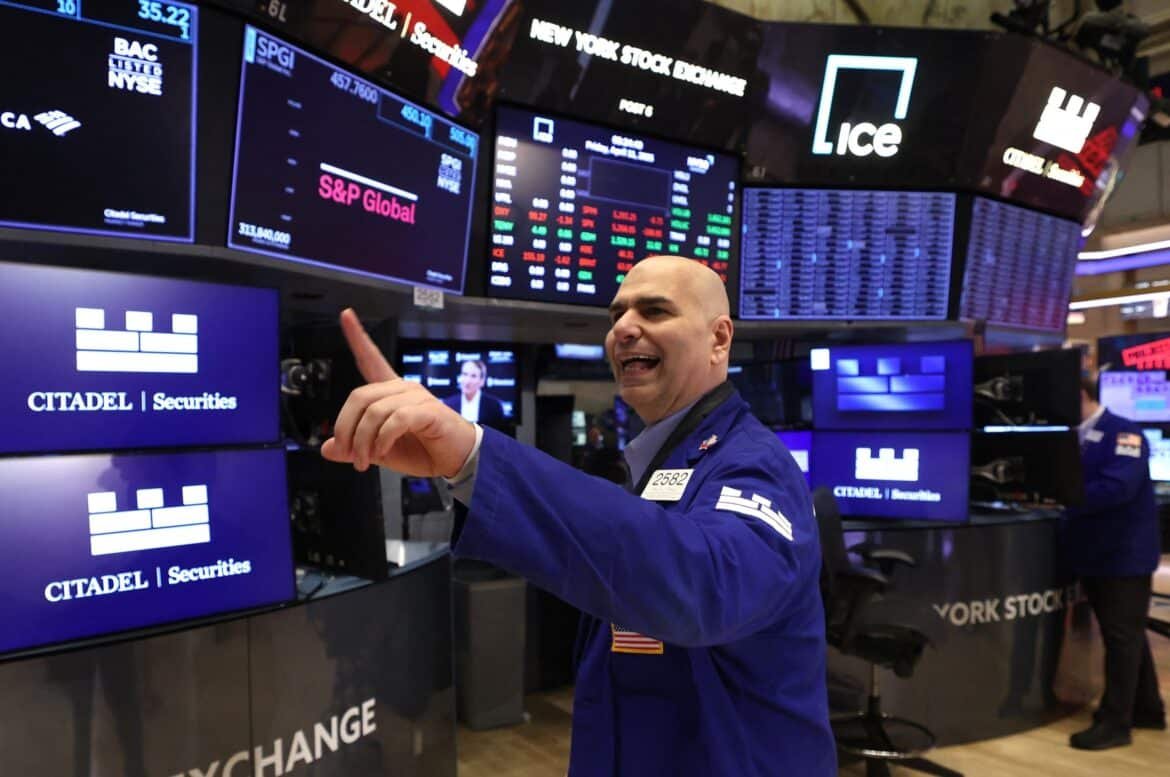American actions closed higher on Friday, ending one of the most volatile weeks in the history of Wall Street at an increase, despite a growing commercial war of the United States and China and the acute fears of inflation.
The Dow Jones industrial average increased 618 points, or 1.5%, at the close of the negotiation. The s& P 500 increased 1.8%, while the nasdaq heavy technological increased by 2%.
Meanwhile, a 10 -year -old treasury sale sent yields to 4.47%. That figure approached a recent maximum reached hours before President Donald Trump announced on Wednesday a 90 -day delay of the so -called “reciprocal tariffs” for most US commercial partners.
A survey by the University of Michigan about the feeling of buyers on Friday showed that the inflation expectations of the year at its highest level since 1981.
Market agitation on Friday morning occurred after China issued an American tariff of 125%, although Beijing said it would not further increase tariffs. The measure occurred in response to a 145% tariff on Chinese products announced by Trump earlier this week.

Merchants work on the floor in the New York Stock Exchange in New York City, on April 11, 2025.
Timothy A. Clary/AFP through Getty Images
Larry Fink, the CEO of the financial firm Blackrock, which manages around $ 11.5 billion in assets, warned that the US economy is prepared for a recession.
“I think we are very close, if not, a recession now,” Fink told CNBC.
In a publication on social networks on Friday, Trump pointed out trust.
“We are going very well in our rates policy. Very exciting for the United States and the world! Social truth.
The US markets closed on Thursday with notable losses, a reversal of the enthusiasm unleashed by Trump’s decision to stop some rates, which triggered a historical demonstration of the sharing market.
Several Asian stock markets became red on Friday morning, reverting the profits obtained on Thursday in the middle of the continuous uncertainty about whether the nations could obtain agreements with Trump to avoid long -term tariffs, and as China announced new reprisal rates on US goods.

A currency merchant reacts near a screen that shows the price index of composite shares of Korea (Kospi) in the foreign exchange room of the KEB Hana Bank headquarters in Seoul, South Korea, on April 11, 2025.
Ahn Young-Joon/AP
Tokyo’s Nikkei 225 index fell 3.8% and the widest Topix index of Japan fell 3.5%. In South Korea, Kospi fell almost 1% and Australia S& P/ASX 200 was submerged 0.95%.
In China, markets fluctuated when investors responded to the White House that clarified that the level of tariffs on Chinese products is now 145%, not 125% as previously believed.
Hong Kong Hang Seng Index increased by 2%, the Shanghai compound index increased 0.6%and the Shenzen component index increased 1.2%, with investors driven by Beijing’s announcement of stimulus measures to reinforce the economy against US tariffs that increase.
Other prominent indexes of Asia in Green on Friday included the Taiwan Taiex index, 2.7% and the Nifty 50 of India 1.9%.
European markets seemed hesitating when they opened and slipped after China announced that it would increase tariffs on US goods from 84% to 125% from Saturday.
The Stoxx 600 Paneuropeo fell 0.3%, Germany’s Dax fell 0.2%, France Cac 40 fell 0.16%and Great Britain FTSE slide 0.03%slid.
On Thursday, Trump again hinted at the resumption of his tariffs.
“If we cannot make the treatment we want to make or we have to do or it is, you know, for both parties, it has to be good for both parties, then we return to where we were,” Trump said.
When asked if he would extend the 90 -day pause, the president replied: “We will have to do what happens at that time.”


